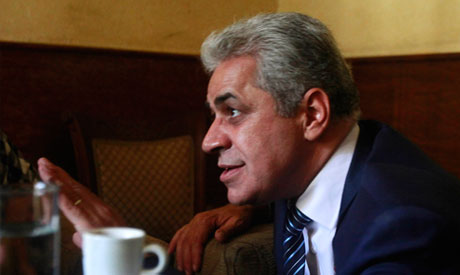 Protesters in Cairo’s Tahrir Square, who showed up in the epicenter of the 2011 uprising Monday evening in the wake of the official announcement of the presidential elections’ first round results, urged disqualified revolutionary candidate Hamdeen Sabbahi to join them while demonstrating.
Protesters in Cairo’s Tahrir Square, who showed up in the epicenter of the 2011 uprising Monday evening in the wake of the official announcement of the presidential elections’ first round results, urged disqualified revolutionary candidate Hamdeen Sabbahi to join them while demonstrating.
Former presidential contender Khaled Ali, a left-wing labour lawyer, has led hundreds in chants against the results in the iconic square all night.
Egypt's Supreme Presidential Electoral Commission (SPEC) had officially announced earlier in the day that Muslim Brotherhood candidate Mohamed Mursi and last Mubarak-era premier Ahmed Shafiq will face each other in a runoff vote slated for 16 and 17 June.
The decision was followed by growing tensions, with a few thousand demonstrators heading to Tahrir Square to protest the results, as unknown assailants set ablaze the headquarters of the Shafiq’s electoral campaign, a luxurious Villa in Cairo’s Dokki district.
Among the chants resounding in Tahrir as numbers seemed to grow were calls for Sabbahi, who came third, to join them. “Come on Hamdeen, the revolutionaries are here standing their ground,” they said.
On Saturday, some of Sabbahi’s supporters revealed during a campaign rally in Cairo their intention to protest in Tahrir should he fail to make it to the second round. The candidate is yet to comment or take action towards the ongoing mass protests.
Moreover, flocks of protesters were led to Tahrir on Monday by another eliminated revolutionary candidate, Khaled Ali, who headed a 5000-strong march in downtown and settled in the focal point of the uprising, which toppled president Hosni Mubarak last year. Ali described the election results as “rigged.”
Among other slogans repeated by protesters, who nearly filled Tahrir and surrounding streets, are “You can never trust the military,” “Sell out the revolution, [Mohamed] Badie, [the Supreme Guide of the Muslim Brotherhood],” and “our president is one of us,” in reference to Sabbahi.
While the demands of the masses in Tahrir appear to be unclear, some of the protesters distributed hands out calling for re-elections, in which revolutionary candidates in Sabbahi, moderate Islamist Abdel Moneim Abul-Fotouh, Khaled Ali, Abul-Ezz El-Hariri, opposition figure Mohamed El-Baradei and TV presenter Bothina Camel would complete.
The alternative solution the protesters offered was to form a presidential council consisting of three members who shall be chosen by a host of revolutionaries figures, including the aforementioned.
There is no love lost between Shafiq and Egypt’s revolutionary camp.
Egypt's civil aviation minister from 2002 to 2011, Shafiq has held a host of high-level government and military positions. In the final days of the Mubarak regime last year, he was appointed prime minister in hopes of taking the wind out of the sales of the Tahrir Square uprising – albeit to no avail.
During his brief stint as interim premier, Shafiq faced a firestorm of criticism over his unequivocal support for Mubarak and his antipathetic attitude to the revolution.
Many critics also blame him for the infamous 'Battle of the Camel,' evidently launched by Mubarak cronies at the height of the revolution in a bid to clear Tahrir Square of anti-regime protesters and end the nascent revolt.
While Shafiq was never accused of direct involvement in the incident, which saw dozens killed and injured on 2 February of last year, he was nevertheless criticised for having headed up the government at the time.
Shortly after Mubarak's ouster, Shafiq was relieved of his duties and all but vanished from the political scene. The announcement of his presidential bid last December, however, marked his return to the public arena – and reignited hostility between him and Egypt's revolutionary forces, which categorically reject the notion of seeing a Mubarak-era minister assume the presidency.
On the other hand, the revolutionaries are also far from willing to cast their ballots for the Brotherhood’s Mursi, thanks to the group’s previous postures towards anti-military rule demos last year, not to mention the fact that the Brotherhood dominates nearly half of the parliament’s seats. A president from the same group would give them ultimate political power, critics believe.
Mursi was the last entrant into the presidential race, but managed – through extensive electoral campaigning by the Brotherhood and its Freedom and Justice Party (FJP) – to amass the largest number of votes in the first round of voting on Wednesday and Thursday.
FJP Chairman Mursi, however, had not been the first choice of the Brotherhood, which – after backtracking on an earlier decision not to field a presidential candidate – unveiled Khairat El-Shater in April as its nominee for highest office.
El-Shater was disqualified from the race by the SPEC a fortnight later for legal reasons, however, to be replaced by Mursi as the Brotherhood's nominee.
For weeks, Mursi was described as the Brotherhood's "substitute candidate" – even derided by some critics as a "spare tire" – until he proved his detractors wrong.



